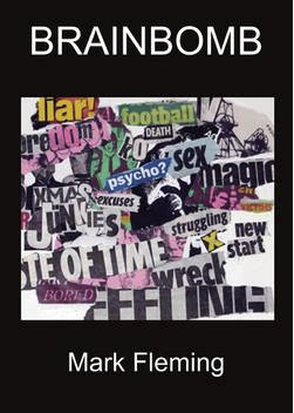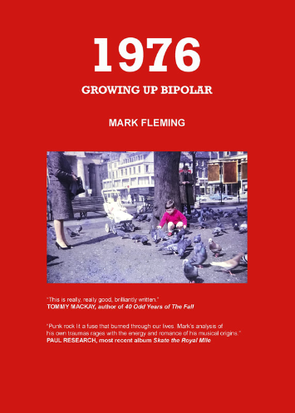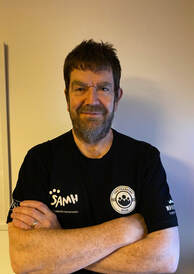John Murphy, a facilitator with Bipolar Edinburgh, recently made contact. John was kind enough to not only compliment this site, but also order a copy of my memoir, 1976 - Growing Up Bipolar, then invite me to give a talk at Bipolar Edinburgh.About Bipolar Edinburgh Bipolar Edinburgh operate community-based self-help groups that promote mental wellbeing by providing support and information for everyone affected by bipolar, and their carers, aiming to be as inclusive as possible, offering participants the chance to attend most meetings in person and online. Meetings currently take place at the Melting Pot on Calton Road (the former location of The Venue; acts performing in its heyday included Hue and Cry, Deacon Blue, Steve Marriott, Manic Street Preachers, The Stone Roses, and Radiohead, not to mention, in its previous incarnation as The Jailhouse, my own band, Little Big Dig!) Everyone affected by bipolar is welcome, including carers, family, and friends, in a safe confidential space where peer support can be accessed, and new ways of managing bipolar, including sharing personal experiences, learned. Guest speakers are welcomed on the first Thursday of every month, with attendees being given the chance to join in with the group at the Melting Pot or via Zoom. The speakers cover topics relating to bipolar, their talks being followed by a chat over tea and coffee. The meetings finish at 8:45pm, although participants can stay on Zoom for a chat after the speaker has finished. Inside, I had time to grab a coffee with John and Michelle from the group's leadership team, as well as some kent faces from The Changing Room at Easter Road, an outreach programme run by Scottish Action for Mental Health (SAMH), under the umbrella of Hibs Community Foundation (HCF), as well as senior clubs across Scotland. My own bipolar journey After reiterating the ethos behind Bipolar Edinburgh, a self-help group for anyone living with bipolar, run by volunteers with lived experience, John welcomed me to the floor. I began by mentioning some of the previous outlets where I'd shared my story, from community groups to prisons, as well as schools. Through the Scottish Book Trust, I've received requests to run creative writing workshops using mental health as a theme, as well as generic writing classes (for instance, I was appointed Writer in Residence at Kirkcaldy High School in 2018, mentoring a bunch of highly imaginative 13-year-old Fifers!) I spoke about my initial diagnosis with a 'schizophrenic episode' in 1987 following a spell of severe depression, resulting in my being sectioned and spending time in the Royal Edinburgh Hospital's Intensive Psychiatric Care Unit. Three years later, I succumbed to mania, and was hospitalised again. Describing these lows and highs, I referred to the medication I was placed on, from chlorpromazine ('the chemical straitjacket') to long-term lithium, and talked about my decision to ask my psychiatrist about being weaned off the latter after 30 years. Denial I discussed writing about bipolar. After my peak psychotic spells during my 20s, I was reluctant to broach what was still a heavily stigmatised topic. My default position was to either pretend my reasons for spending time in a locked ward in the Royal Edinburgh Hospital were for a period of 'rehab' (which sounded less loaded than admitting to a mental breakdown) or simply to sweep my medical history under the carpet. BrainBomb and 1976 - Growing Up Bipolar After modest success at writing contemporary Scottish fiction, I was persuaded to use my lived experience of mental ill health as a source for some vivid memoir writing. Out of that, my novel, BrainBomb arose. This was a disjointed effort, written as fiction, with fantasy sequences making up for the many memories of that period which were fuzzy (due to recreational or prescribed drugs, or as my bipolar dips persisted, increasingly bizarre delusions). Requesting a copy of my psychiatric case file from the Scottish NHS gave insight into those years of treatment as an inpatient and outpatient, from doctor appointments to suggested medical interventions (medication or possibly even electro-convulsive therapy) to exhaustive accounts of my erratic behaviour during my hospital admission for mania. I explained how this knowledge allowed me to rewrite my story as a memoir, 1976 - Growing Up Bipolar.
I stated my mental health hadn't been impaired by coming off medication, although I remained conscious about my potential to regress. Instead of taking pills, I explained my priorities were now creativity (especially writing articles about bipolar, writing about the mental health experiences of friends, writing fiction set in Edinburgh, and writing songs), listening to music - a lot of music! - exercise, a healthy diet, going back to Easter Road now and again (before life got in the way, I was fanatical as a youngster), and sharing my bipolar journey with others who'd travelled similar routes and could empathise. I concluded this aspect of my talk - recovery and ongoing wellbeing - by highlighting the commendable and sometimes, literally, lifesaving outreach programme, The Changing Room, and its offshoot, the monthly drop-in run by HCF volunteers, Supporting Our Supporters. Q and A After talking about the cathartic effect of writing about bipolar, John directed questions from the floor. I was asked how I'd felt after coming off medication. Although I admitted this had worked for me, John commented bipolar is unique to individuals; it's down to each person, and some may be reliant on meds for achieving stability. Someone asked about how to channel writing, especially when bipolar surges prompt an outpouring of creativity. My answer was a major part of the writing process, regardless of the medical situation, was editing, likening writers to sculptors chipping away and honing early drafts. John suggested blogging was tailor-made for relating bipolar experiences, as it provided the incentive to produce ongoing updates on anyone's state-of-mind. This focus could help contextualise feelings, positive or negative, as well as giving the opportunity to recognise the onset of bipolar episodes and help manage them. On my part, blogging about mental health was crucial to my ongoing wellbeing, while a 'second edition' of 1976 - Growing Up Bipolar, revamped with additional material about SAMH and The Changing Room, is due for publication later in 2024. What's on for March John previewed more events planned for March. These include a 'Cuppa and Chat' in Coffee Saints on Little King Street, where all are invited for a hot drink and a chat in a fully accessible social enterprise cafe near St James Quarter (pop Wednesday 17 March, 2-3.30pm in your diary), and the regular quiz night. See the full programme of Bipolar Edinburgh events. He further clarified the group would eventually be moving premises to the conference centre in St Mary Street. |
|




 RSS Feed
RSS Feed
